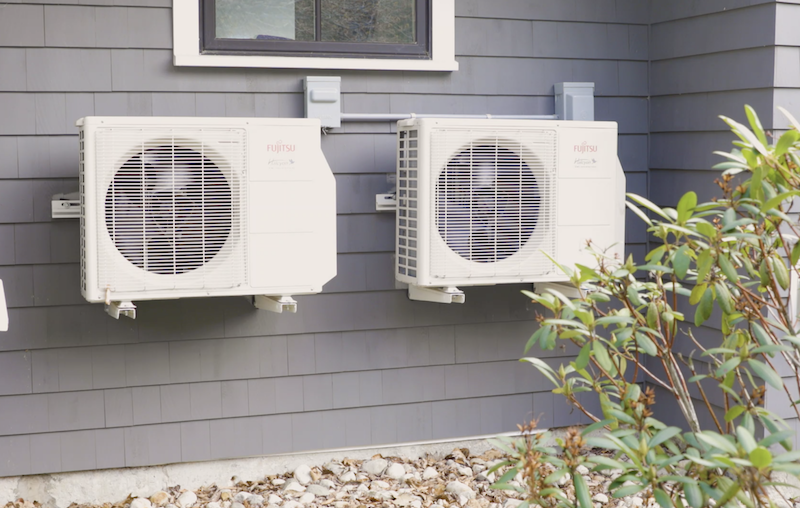
With New England summers only getting hotter, we need a way to deal with spiking temperatures and electricity bills. Heat pumps can help. Photo: Ecophotography.
An earlier version of this blog was published on July 13, 2023.
New England heat waves are becoming more common – with temperatures soaring well above 90 degrees. As sweltering heat becomes our new summer normal, we’ll all be cranking up our ACs and turning on fans to stay cool more often.
But let’s be honest – staying cool costs a pretty penny. Summer heat waves spike temperatures and electricity bills.
We know that electric heat pumps are energy-efficient and can cut heating bills while keeping your home warm in the winter. But how do heat pumps work in the summer?
Here’s How Heat Pumps Work in the Summer, Too
In the summer, heat pumps extract heat from the room. Air-source heat pumps transfer the heat from the air inside your home and expel it outdoors – the reverse of what they do in the winter (transfer heat from the air outside and draw it into your home). Yes – they work just as well in the sizzling heat as they do in the icy cold.
Ground-source heat pumps diffuse heat from the air into the ground via cooler rock, soil, or groundwater around it. While more cost-efficient in the long term, ground-source heat pumps have a higher upfront installation cost than air-source heat pumps. So, ground-source heat pumps are suitable for larger buildings like corporate offices.
There’s also emerging technology that allows renters to use window unit heat pumps, with no hard installation required. These units can help non-homeowners get similar benefits from efficient heating and cooling.
Heat Pumps Can Cut Your Electricity Bills
Heat pumps are energy efficient since they only transfer heat in or out of your home, not create hold or cold air the way a furnace or AC does. That means they use less electricity to run, lowering your bills in the process.
Energy efficiency is especially important when we consider how expensive and price volatile New England’s electricity prices are. Our region relies heavily on burning imported fossil fuels like natural gas to generate electricity, which means our gas must travel long distances to reach our homes – increasing its cost. Additionally, because of New England’s dependence on imported liquified natural gas, we must contend with drastically inflated prices when international crises affect supply lines.
The short story? The cost of fossil fuel-generated electricity is expensive and unpredictable – air conditioning units alone cost homeowners about $29 billion a year. Heat pumps can insulate families and businesses from those costs by consuming less electricity and lowering energy demand across the board.
Slashing Climate Pollution with Heat Pumps
The US Department of Energy estimates that air conditioners are responsible for over 100 million metric tons of carbon dioxide each year. That’s pollution overheating the planet and fueling extreme weather, higher temperatures, and so much more.
Because heat pumps are so energy efficient, they create less climate-damaging pollution than traditional air conditioners. While we upgrade to 100% clean energy, making sure our appliances are efficient (and therefore using fewer fossil fuels) is critical to cutting carbon pollution.
Additionally, energy efficiency helps us conserve energy during extreme heat, which is beneficial for two main reasons.
First, during those dreadful 90-degree days when everyone is running their air conditioners and fans, we must turn on specific reserve power plants to meet heightened energy demands. These power plants often burn the dirtiest, most polluting, and most expensive fuels like oil – which jacks up customers’ bills. Energy efficiency also reduces stress on the electricity grid during these periods of extreme heat, helping prevent power outages when people need to use electricity the most.
Getting Heat Pumps to All of New England
The upfront costs of installing heat pumps are nothing to ignore, despite their long-term cost savings. And with the Trump administration rolling back federal incentives that helped buffer the costs of purchasing and installing heat pumps, state governments need to step in and ensure this technology is affordable and accessible to everyone.
In the past few years, there’s been more awareness around the benefits of upgrading to energy-efficient technology. For example, Vermont passed the Affordable Heat Act, which requires companies that import fossil fuels for home heating to help residents switch to cleaner heating systems, such as heat pumps. And CLF is tracking Massachusetts’ planned Clean Heat Standard. We want the Massachusetts version to support widespread use of heat pumps across the Commonwealth rather than false climate solutions like so-called “renewable natural gas.”
So, now you know how heat pumps work in the summer: They can cool your home while saving you money on utility bills and slashing carbon pollution. And nothing could be more relaxing in the relentless heat than chilling out knowing you’re not driving your bills or climate-warming pollution up further.



